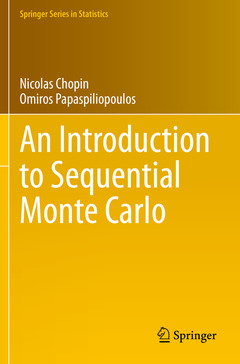Description
An Introduction to Sequential Monte Carlo, 1st ed. 2020
Springer Series in Statistics Series
Authors: Chopin Nicolas, Papaspiliopoulos Omiros
Language: English
Subjects for An Introduction to Sequential Monte Carlo:
Approximative price 63.29 €
In Print (Delivery period: 15 days).
Add to cartPublication date: 10-2021
378 p. · 15.5x23.5 cm · Paperback
89.66 €
In Print (Delivery period: 15 days).
Add to cartPublication date: 10-2020
378 p. · 15.5x23.5 cm · Hardback
Description
/li>Contents
/li>Biography
/li>Comment
/li>
This book provides a general introduction to Sequential Monte Carlo (SMC) methods, also known as particle filters. These methods have become a staple for the sequential analysis of data in such diverse fields as signal processing, epidemiology, machine learning, population ecology, quantitative finance, and robotics.
The coverage is comprehensive, ranging from the underlying theory to computational implementation, methodology, and diverse applications in various areas of science. This is achieved by describing SMC algorithms as particular cases of a general framework, which involves concepts such as Feynman-Kac distributions, and tools such as importance sampling and resampling. This general framework is used consistently throughout the book.
Extensive coverage is provided on sequential learning (filtering, smoothing) of state-space (hidden Markov) models, as this remains an important application of SMC methods. More recent applications, such as parameter estimation of these models (through e.g. particle Markov chain Monte Carlo techniques) and the simulation of challenging probability distributions (in e.g. Bayesian inference or rare-event problems), are also discussed.The book may be used either as a graduate text on Sequential Monte Carlo methods and state-space modeling, or as a general reference work on the area. Each chapter includes a set of exercises for self-study, a comprehensive bibliography, and a ?Python corner,? which discusses the practical implementation of the methods covered. In addition, the book comes with an open source Python library, which implements all the algorithms described in the book, and contains all the programs that were used to perform the numerical experiments.
1 Preface.- 2 Introduction to state-space models.- 3 Beyond state-space models.- 4 Introduction to Markov processes.- 5 Feynman-Kac models: definition, properties and recursions.- 6 Finite state-spaces and hidden Markov models.- 7 Linear-Gaussian state-space models.- 8 Importance sampling.- 9 Importance resampling.- 10 Particle filtering.- 11 Convergence and stability of particle filters.- 12 Particle smoothing.- 13 Sequential quasi-Monte Carlo.- 14 Maximum likelihood estimation of state-space models.- 15 Markov chain Monte Carlo.- 16 Bayesian estimation of state-space models and particle MCMC.- 17 SMC samplers.- 18 SMC2, sequential inference in state-space models.- 19 Advanced topics and open problems.
Omiros Papaspiliopoulos (PhD, Lancaster University, 2003) is an ICREA Research Professor and Director of the Data Science Center at Barcelona Graduate School of Economics. Previous positions include Full Professor at Universitat Pompeu Fabra, Assistant Professor at Warwick University and Research Associate at Lancaster and Oxford University.
He is currently co-editor of Biometrika, and has been an Associate Editor for the Journal of the Royal Statistical Society Series B, Biometrika, Journal of Uncertainty Quantification (SIAM) and Statistics and Computing. He has delivered more than 100 invited talks, and has given courses at ENSAE in Paris, the Berlin Mathematical School, the Department of Mathematics at the University of Copenhagen, and the Engineering Department at Osaka University. In 2010 he was awarded the Royal Statistical Society’s Guy Medal in Bronze.
His research interests include computational statistics, applied mathematics and machine learning.
Nicolas Chopin (PhD, Université Pierre et Marie Curie, Paris, 2003) has been a Professor of Statistics at ENSAE, Paris, since 2006. He was previously a lecturer at Bristol University (UK).
He is a current or former associate editor for Annals of Statistics, Biometrika, Journal of the Royal Statistical Society, Statistics and Computing, and Statistical Methods & Applications. He has served as a member (2013-14) and secretary (2015-16) of the research section committee of the Royal Statistical Society. He received a Savage Award for his doctoral dissertation in 2002.
His research interests include computational statistics, Bayesian inference, and machine learning..
Offers a general and gentle introduction to all aspects of particle filtering: the algorithms, their uses in different areas, their computer implementation in Python and the supporting theory
Covers both the basics and more advanced, cutting-edge developments, such as PMCMC (particle Markov chain Monte Carlo) and SQMC (Sequential quasi-Monte Carlo)
Comes with a freely available Python library (particles), which implements all the algorithms discussed in the book. Each chapter ends with a “Python corner” that discusses how the methods covered can be implemented in Python
These books may interest you

Monte Carlo Methods 116.04 €



